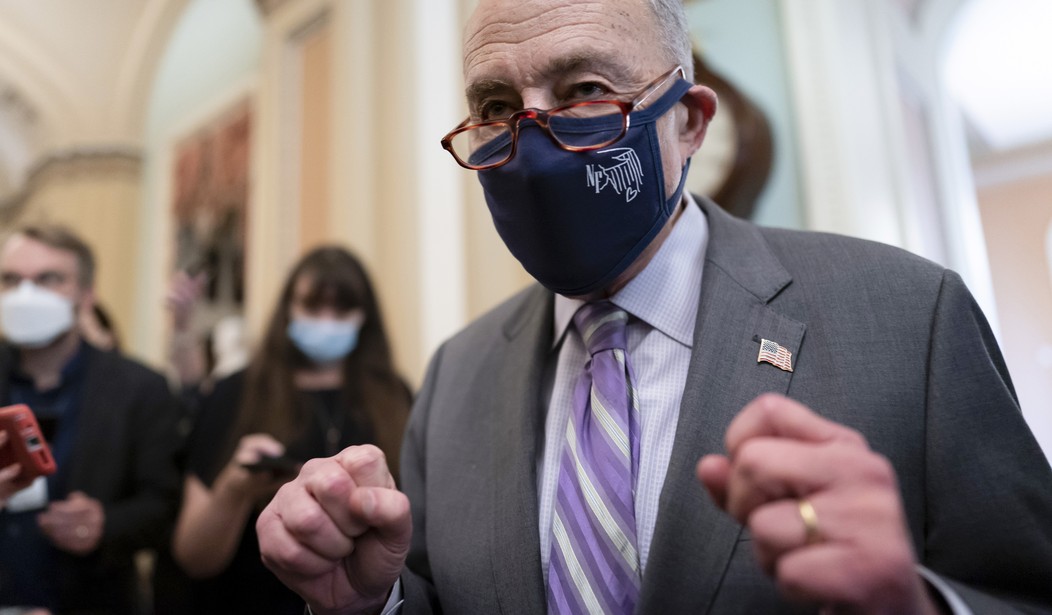With the anniversary of January 6th this week, Democrats are using it to push massive election reforms. They claim the reforms are necessary to save Democracy. Indeed, Senate Majority Leader Chuck Schumer (D-NY) says the situation is so dire that it is necessary to change long-held Senate rules so that Democrats can pass the bill on a pure party-line vote.
The For the People Act of 2021 replaces state voter ID rules with a signed statement from the voter, and makes permanent the pandemic’s mail-in ballot voting. The mailing out of blank absentee ballots en masse would become a fixture of American elections. But the bill goes well beyond that: for example, replacing the bipartisan structure of the Federal Election Commission with one-party control and regulating advertising in newspapers and other media.
Put aside the absurdly false claims that was an attempted overthrow of the government and a threat to democracy. Even the increasingly partisan FBI “found scant evidence that the Jan. 6th attack on the U.S. Capitol was the result of an organized plot to overturn the presidential election result.” Absolutely no one has even been charged with trying to overthrow the government.
In 2005, the Carter-Baker Commission on Federal Election Reform issued a report that proposed a uniform system of requiring a photo ID in order to vote in U.S. elections. The report also pointed out that widespread absentee voting makes vote fraud more likely. Voter files contain ineligible, duplicate, fictional, and deceased voters, a fact easily exploited using absentee ballots to commit fraud. Citizens who vote absentee are more susceptible to pressure and intimidation. And vote-buying schemes are far easier when citizens vote by mail. The For the People Act will eliminate the few safeguards that we still have.
Recommended
Despite the constant claims in the media, there is significant evidence of vote fraud in the 2020 presidential election. In addition, a just conducted initial audit of four counties in Texas found over 11,000 potential non-citizens registered to vote. A review of Pennsylvania and Nevada show that there were tens of thousands more votes counted than people who were officially recorded as voting.
But the fact is that the U.S. is already an outlier among the world’s democracies in not requiring a government-issued tamper-resistant voter ID. In research done by the Crime Prevention Research Center, we found that of the 47 countries in Europe today, 46 of them currently require government-issued photo IDs to vote. The odd man out is the United Kingdom, in which Northern Ireland and many localities require voter IDs, but the requirement is not nationwide. The British Parliament, however, is moving to a nationwide requirement, so very soon all 47 European countries will likely have adopted this common-sense policy.
When it comes to absentee voting, we Americans, accustomed as we are to very loose rules, are often shocked to learn that 35 of the 47 European countries—including France, Italy, the Netherlands, Norway, and Sweden—don’t allow absentee voting for citizens living in country. Another ten European countries—including England, Ireland, Denmark, Portugal, and Spain—allow absentee voting, but they require voters to show up in person and present a photo ID to pick up their ballots. It isn’t like in the U.S., where a person can say he will be out of town and have a ballot mailed to him.
England used to have absentee voting rules similar to ours in the U.S. But in 2004, in the city of Birmingham, officials uncovered a massive vote fraud scheme in the city council races. The six winning Labor candidates had fraudulently acquired about 40,000 absentee votes, mainly from Muslim areas of the city. As a result, England ended the practice of mailing out absentee ballots and required voters to pick up their ballots in person with a photo ID.
Up until 1975, France also had loose absentee voting rules. But after discovering massive vote fraud on the island of Corsica—where hundreds of thousands of votes by dead people and even larger-scale vote-buying operations — France banned absentee voting altogether.
The U.S. did not always have secret ballots regarding buying votes. Only in 1880 did the first state adopt the secret ballot, and the last state to do so was South Carolina in 1950. Perhaps surprisingly, when states adopted secret ballots, the percentage of people voting fell by about twelve percent. Why? Before adopting the secret ballot, lots of people would get paid for voting. In those days, people voted by placing pieces of colored paper in the ballot box, with different colors representing different parties. Party officials would be present to observe what color paper each voter put into the box, and depending on the color, the voter would often get paid. Secret ballots put an end to this practice.
France learned in 1975 that the use of absentee ballots led to the same practice—it allowed third parties to know how people voted and pay them for voting a certain way. Unfortunately, this same problem is now increasing in the U.S. in the form of “ballot harvesting,” the increasingly common practice where party functionaries distribute and collect ballots.
Defenders of our current voting rules point out that some European countries allow “proxy voting,” whereby one person can designate another to vote for him in place of absentee voting. And while it is true that eight of the 47 European countries allow proxy voting—meaning that 39 do not—there are strict requirements. In five of the eight countries—Belgium, England, Monaco, Poland, and Sweden—proxy voting is limited to those with a disability or an illness or who are out of the country. In Poland, it also requires the approval of the local mayor, and in Monaco, the approval of the general secretariat. In France and the Netherlands, a notary public proxy must witness the approval process. Switzerland is the only country in Europe with a relatively liberal proxy voting policy, requiring only a signature match.
How about our neighbors, Canada and Mexico? Canada requires a photo ID to vote. If a voter shows up at the polls without an ID, he is allowed to vote only if he declares who he is in writing and someone is working at the polling station who can personally verify his identity.
Mexico has had a long history of election fraud. Partly because its leaders were concerned about a drop in foreign investment if it wasn’t perceived to be a legitimate democracy, Mexico recently instituted strict reforms. Voters must present a biometric ID—an ID with a photo and a thumb print. Voters also have indelible ink applied to their thumbs, preventing them from voting more than once. And absentee voting is prohibited, even for people living outside the country.
Those who oppose election integrity reform here in the U.S. often condemn it as a means of “voter suppression.” But in Mexico, the percent of people voting rose from 59 percent before the reforms to 68 percent after. It turned out that Mexicans were more, not less, likely to vote when they had confidence that their votes mattered.
Democrats and the media ignore the rest of the world's rules because no one would seriously consider their claims that all these countries are anti-democratic. Democrats, not Republicans, are the real threat to democracy.
Lott is the Chief Data Analyst, Election Integrity Division, America First Policy Institute and President of the Crime Prevention Research Center. Lott was the senior adviser for research and statistics at the U.S. Department of Justice’s Office of Legal Policy at the end of the Trump administration and studied vote fraud issues.
























Join the conversation as a VIP Member